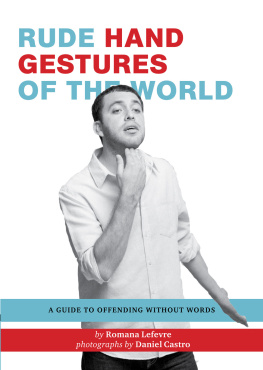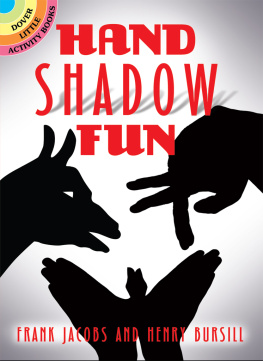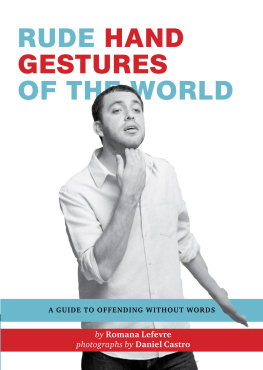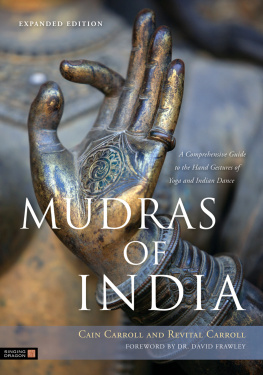Evolutionary anthropologists tell us that gesture is much older than speech. When early humans had something to say, they said it with their hands. And because manners didnt come along until a great deal later, it seems safe to assume that much of what people said was rude. Perhaps they wanted to disparage Ogs performance in the bison hunt or the size of Bogs manhood. We dont know what signs they used, but we can be sure they used some.
By the time history was being recorded, its rude hand gestures were, too. Many of these are still in use today. Ancients insulted one another using many of the same gestures we use now, often with surprising gusto and frequency. In ancient Rome, the gesture popularly known as the Finger was so common that it even had a name: digitus impudicus.
Over the next several thousand years, the language of hand gesture continued to evolve, with each region of the world developing its own colorful vocabulary of rude signs. These gestures express not just vulgar sentiments but deep truths about the culture itself. The insults a given culture favors are very revealing. Just as the Eskimos have many words for snow, so the French have an infinite number of gestures to express ennui; the Lebanese, romantic desires; and the British, an urgent wish that you piss off.
The language of hand signals continues to grow and change, with new gestures entering the vocabulary all the time. New gesturers enter as well. For most of history, hand gesturingeven the nonvulgar varietywas an almost exclusively male activity. Happily, in much of the world, that is no longer true, as more and more women proudly give the Bird.
Hand gestures point, quite literally, to where weve been and where were going. They are especially relevant today. The advent of air travel means that one can find oneself in a distant country in a matter of hours and knowing not a single word. We hope this book will make your travels easierand much more interesting.
It is easy for an innocent abroad to commit an unforgivable faux pas. Learn the gestures that follow, and you will be innocent no more; your missteps will be made with purpose and intent. Let the offending begin!
When doing business abroad, it is important to know the local body language. The uninformed can easily commit terrible blunders without even knowing what theyve done. Every culture is different, and what is considered polite in one office environment can be deeply offensive in another. In Japan, for instance, one causes affront by presenting a business card using one hand instead of two. Crossing ones legs in Saudi Arabia, especially if this exposes the sole of the shoe, is a grievous insult. Knowing the local customs will ensure you dont accidentally give offense.
At other times, however, giving offense is exactly what the savvy businessperson must do. Perhaps you want to communicate your distrust or to inform your associates theyre being stingy. To avoid being taken advantage of, you must let the dishonest know youre on to them. When negotiations get tough, these gestures will help you maintain the upper hand.
Meaning: I find you untrustworthy.
Used in: Southern Italy
In business, it is important to let your associates know you cant be taken advantage of. This gesture informs them you are on to their attempts to deceive. To perform, move your nose side to side with the index and middle finger. The movement suggests that something stinks, and you are trying to rid yourself of the odor.

I find you untrustworthy.
Meaning: Not to be trusted
Used in: Southern Italy
Although crabs themselves are perfectly honest and straight-forward, it is true that their manner of walkingan unpredictable, side-to-side scampersuggests otherwise. This hand gesture, another southern Italian accusation of deceit, links the pinky fingers to mimic a crabs movements, implying that the subject is untrustworthy.

He is not to be trusted.
Meaning: Bullshit
Used in: Brazil
Papo furado is a Brazilian idiom that means prattle, trivial chit-chat, or, more frankly, bullshit. To make the accompanying gesture, place a flat, extended hand under the chin. This gesture, which should be performed only behind the back of the subject, lets the others in the room know that his idle talk should be disregarded.
NOTE: In other parts of the Americas and western Europe, this gesture means fed up. The chin should be tapped several times to underscore your exasperation.

Thats bullshit.
Meaning: Youre stingy.
Used in: Mexico, South America
Just as the heart is associated with love, so, in many Latin American countries, is the elbow with stinginess. In Mexico the two are so closely linked that a miser is described as muy codo (very elbow), the idea being that he rarely straightens it to pay the check. If your compadre makes a habit of failing to pick up the check, you may wish to correct his behavior with this sharp gesture. For extra emphasis, bang your elbow on the table.
NOTE: In Austria and Germany the same gesture means Youre an idiot, suggesting that the elbow is where the subject keepshis brain.

Youre stingy.
Meaning: Thief
Used in: South America
It is an unfortunate fact that, from time to time, we must encounter people who will try to steal what is ours. When this happens in South America, you may bring it to others attention with this gesture. Simply sweep your arm across the table as if trying to gather any money that might be there. Of course, if you actually gather some money while doing this, your companions will soon be making this gesture in reference to you.
NOTE: In Peru, this gesture more frequently means money.In other South American countries, it can mean pay up.

Hes a thief.
Meaning: You are deluded.
Used in: Israel
As any visitor to Israel knows, the local population is not shy about conveying their feelings openly and honestly. With this gesture, one conveys the feeling that the subject is openly and honestly full of it. The index finger points at the upturned palm of the other hand to imply that grass will grow on my hand before what you say comes true.

You are deluded.












![Advait - Mudras for Sex: 25 Simple Hand Gestures for Extreme Erotic Pleasure & Sexual Vitality: [ Kamasutra of Simple Hand Gestures ]](/uploads/posts/book/81294/thumbs/advait-mudras-for-sex-25-simple-hand-gestures.jpg)






